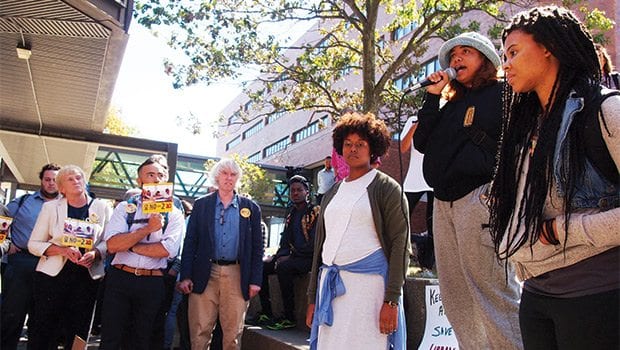UMass students, profs. protest education funding
Demonstrators call for increased public investment

Massachusetts Education Secretary James Peyser elicited boos from faculty and student activists at UMass Boston’s convocation last Thursday, when he called for the state’s public colleges and universities to operate on a “new business model” and quoted industrialist Henry Ford.
The activists gathered for a demonstration following the convocation and decried the school’s $22 budget deficit and tuition increases that they say threaten to cut jobs and put public education out of reach for many of the state’s neediest students.

City Councilor Tito Jackson speaks to UMass students and professors gathered to advocate for more funding.
“We’re here today because we have a different business model,” said economics professor Marlene Kemp. “Our business model is that you do not cut faculty. Our model is that you don’t increase tuition and fees.”
The budget deficits at UMass Boston and elsewhere in the UMass system follow a nationwide pattern of state reductions in public higher education investment. Massachusetts currently spends $1.1 billion on public higher education, down from $1.3 billion in 2001, in inflation-adjusted dollars.
The university’s adjunct professors felt the sting of the school’s declining budget last spring, when 397 received letters informing them they may not be reappointed for the following academic year.
“Some of us were asked to teach new classes, create new syllabi and do the hard work of preparing lesson plans,” said adjunct professor of American studies Cathy Corman, who retained her job. “I didn’t want to spend my summer preparing to teach a class that I wouldn’t be paid for.”
A UMass spokesman said that the letter was sent in accordance with the university’s contract with its faculty union.
“Under the terms of the collective bargaining agreement, UMass Boston is required to notify semester by semester non-tenure-track faculty before the end of the previous semester if they may not be reappointed the following semester,” spokesman DeWayne Lehman wrote in an email to the Banner. “The university was in the process of reexamining its fall schedule to meet student demand most effectively and efficiently. In order to allow time for this process to move forward, while at the same time honoring the reappointment notification deadlines specified by the faculty collective bargaining agreement, a number of non-tenure-track faculty were sent non-reappointment notices. We estimate that approximately 75 percent of those who received notices in May have been appointed to teach this fall.”
For Corman, who has taught for 25 years, the letter was hard to take. Listening to Peyser deliver an address during convocation also was difficult, she said.
“I don’t want to hear that I can be uber-ized,” she told the gathering, referring to the ride-sharing company that symbolizes the gig economy.
Despite the tight funding atmosphere, Peyser has rejected the notion of raising taxes. When English Professor Joseph Ramsey asked Peyser whether he would support the Fair Share amendment, a ballot question that would raise the tax rate on income in excess of $1 million, the education secretary reiterated his opposition and refused to comment further. Proponents say the measure — scheduled to be voted on in 2018 — would raise $2 billion and be dedicated to transit and education.
“He refused to even back up his position today,” said Massachusetts Teachers Association President Barbara Madeloni, whose union represents UMass professors.
Madeloni said the budget cuts in the UMass system are part of a broader agenda aimed at cutting public investment in education and other public services.
“There’s a very dangerous ideology at work that says we should do more with less in our public spaces, rather than we should do more with more,” she said. “What we need to do is not constrain and narrow the possibilities for education, but open them up and create more possibilities. And that means funding.”
Africana studies
UMass Boston faculty of color say they have been particularly hard hit by the university’s belt-tightening. The College of Community and Public Service, which educates a student body that largely is black and Latino, has no central administrator. Professors from CPCS have been assigned to other departments.
A dean with the College of Liberal Arts recently removed the chairman of the Africana Studies Department — an unusual move in the world of academia where faculty elect department chairs — and denied tenure to two adjunct professors in that department.
Student Sadie Barbosa said the treatment of the Africana Studies faculty reflects a departure from the university’s longstanding “urban mission” to educate working class Boston residents.
“This is unfair,” she said during the rally. “We talk about an urban mission when the enrollment is declining for urban students.”
Barbosa read a list of demands from students taking classes in Africana Studies, including a call for the governance of the department to be returned to the faculty, the appointment of a full-time administrative assistant for the department and anti-racism training for the College of Liberal Arts dean’s office.
Question 2
Many who spoke at the demonstration Thursday also spoke out against Ballot Question 2, including City Councilor Tito Jackson, who cautioned against the outsized influence he says the New York investors bankrolling the pro-charter school campaign are having on the ballot measure.
“This is a battle against some of the most connected individuals,” he said. “The young people of Massachusetts are not your market. They are our future.”
Madeloni, whose union has provided much of the more than $6 million in funding for the opposition to Question 2, said she is heartened by the results of a WBUR poll showing 48 percent of Massachusetts voters opposing charter schools and 41 percent in support.
“I am confident that when we have conversations with voters, they come to our side,” she said. “People care about public education in the commonwealth, and they want it fully funded.”







